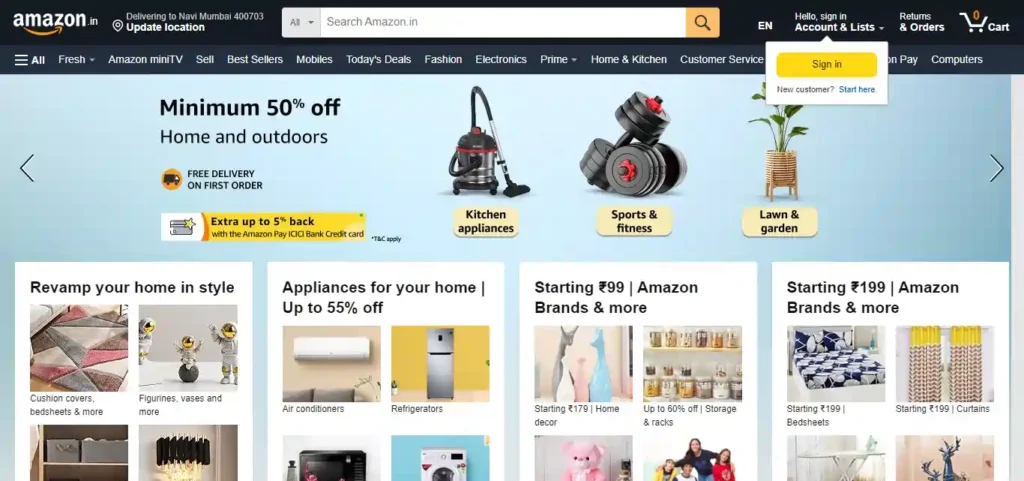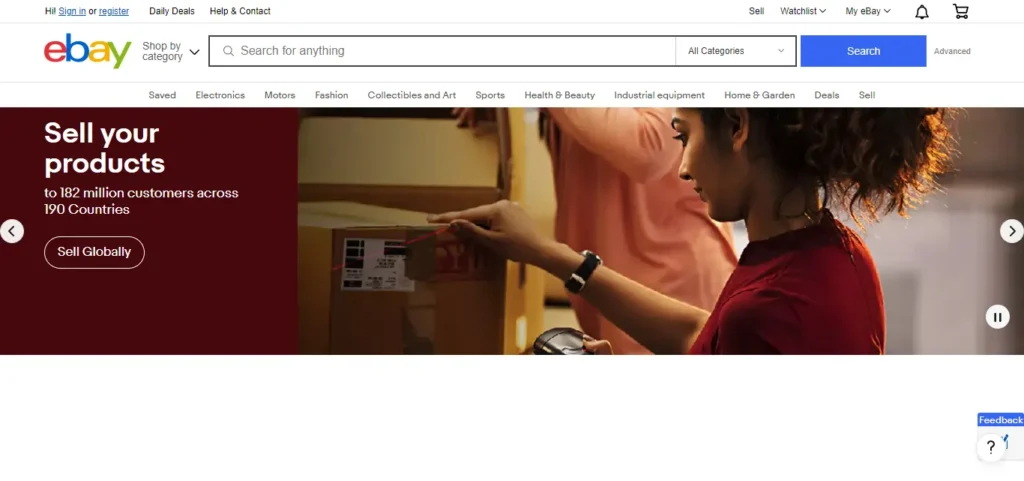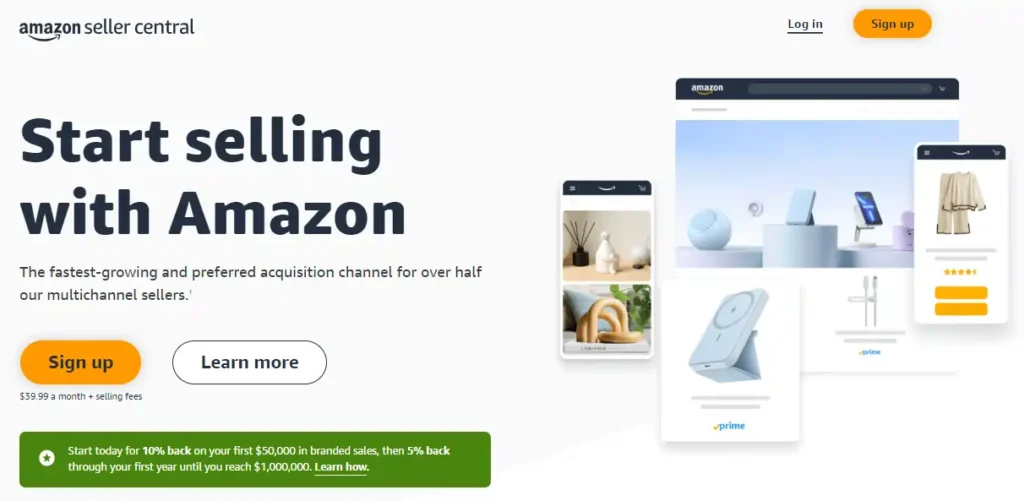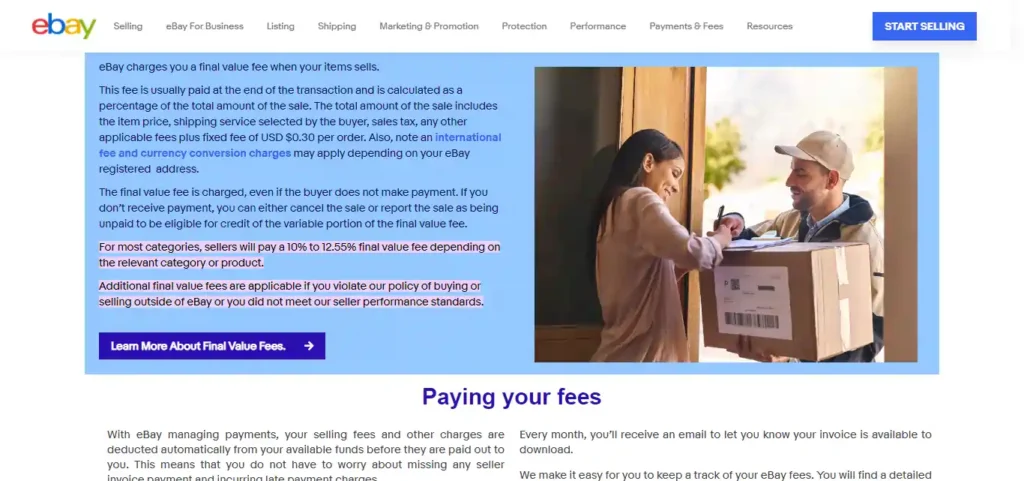The age-old battle of the e-commerce titans – Amazon vs eBay. It's a clash that has raged for decades, with each platform vying for supremacy in the online shopping world.
On one side, we have Amazon, the undisputed king that has redefined convenience with its vast selection and lightning-fast delivery. On the other, eBay stands as the virtual flea market where bargain hunters can unearth hidden gems and engage in a thrilling bidding war.
But which one is a better choice when it comes to selling? Is Amazon's streamlined shopping experience worth the premium prices, or does eBay's treasure full of unique finds make it the more enticing option?
Well, let's plunge into this article to understand which eCom player might be the right fit for you.
Amazon Vs eBay Quick Comparison
| Feature | Amazon | eBay |
|---|---|---|
| Business Model | Retailer selling own inventory + 3rd party marketplace | Online auction and 3rd party marketplace |
| Product Types | New products across many categories | New and used products, unique/rare items |
| Pricing | Fixed prices | Fixed prices and auction-style bidding |
| Seller Fees | More complex fee structure based on category | Simpler final value fee based on the sale price |
| Shipping | Offers Fulfillment by Amazon (FBA) | Sellers handle their own shipping or use the Global Shipping Program |
| Customer Base | Larger customer base (300+ million) | Smaller but loyal customer base (159 million) |
| Brand Control | Less control for 3rd party sellers | More brand control for sellers |
| Payment | Amazon handles all payments | Sellers can use PayPal, credit cards, etc. |
Head-to-Head Comparison
While the table above provides a high-level overview of the differences between Amazon and eBay, we'll delve deeper into a comprehensive analysis in the subsequent sections.
Buckle up as we meticulously compare these e-commerce titans across crucial parameters such as trust and consumer perception, fulfillment methods, fee structures and cost analysis, product restrictions, market positioning, as well as seller policies, and overall experience.
By dissecting these vital aspects, we aim to equip you with a thorough understanding of the strengths, weaknesses, and nuances that define each platform.
1. Trust and Consumer Perception
Both platforms have their quirks and perks, and understanding how they build consumer trust can make or break your selling game.
Amazon's Trust Game

Amazon's all about making you feel safe and sound. They’ve got this return policy that’s practically a warm hug for buyers. If something's not right, you can send it back without jumping through hoops. This makes folks feel secure and more likely to hit that “Buy Now” button.
Then there's Amazon Prime. Over 168 million Americans are hooked on it. Why? Because Prime members get fast shipping, exclusive deals, and a bunch of other goodies. These perks keep them coming back, especially during big sales like Black Friday and Prime Day. For sellers, this means a steady stream of eager shoppers ready to splurge.
eBay's Wild Ride

eBay is like a treasure hunt. You can find anything from a vintage comic book to the latest gadget. This variety pulls in a mixed crowd looking for unique finds and bargains.
Trust in eBay is built through its feedback system. Buyers and sellers rate each other, which helps build credibility. But, eBay's return policies aren't as cushy as Amazon's, which can make some buyers a bit wary. Still, eBay's auction-style listings and “Buy It Now” options offer a level of flexibility that many shoppers love.
To boost confidence, eBay has buyer protection programs that help resolve disputes and safeguard transactions. These measures make buyers feel more comfortable purchasing from different sellers.
2. Fulfillment Methods Comparison
When you're deciding between selling on Amazon vs eBay, one big difference is how you get your products to customers. Knowing your options can help you pick the right platform for your business.
Options on eBay
On eBay, you mainly have to handle fulfillment yourself or hire someone else to do it. This is called self-fulfillment, and it means you take care of inventory, packing, and shipping.
| Fulfillment Method | Description | Pros | Cons |
|---|---|---|---|
| Self-Fulfillment | You pack and ship orders yourself | Full control; lower costs | Time-consuming; need storage space |
| Third-Party Fulfillment | Hire an external service to handle fulfillment | Saves time; scalable | Extra costs; less control |
Some eBay sellers even use Amazon to fulfill orders, shipping items from Amazon warehouses. This can confuse buyers, especially with returns.
Amazon's Fulfillment Choices
Amazon offers more structured options. You can choose between Fulfillment by Merchant (FBM) and Fulfillment by Amazon (FBA).
Fulfillment by Merchant (FBM)
With FBM, you handle storage, packing, and shipping yourself. It's similar to eBay's self-fulfillment and gives you more control.
| Fulfillment Method | Description | Pros | Cons |
|---|---|---|---|
| FBM | You manage your own inventory and shipping | More control; potentially lower costs | Time-consuming; manage logistics |
Fulfillment by Amazon (FBA)
FBA lets you store products in Amazon's warehouses. Amazon takes care of storage, packing, and shipping. It's popular because it's convenient and gives access to Amazon Prime customers.
| Fulfillment Method | Description | Pros | Cons |
|---|---|---|---|
| FBA | Amazon handles storage, packing, and shipping | Saves time; access to Prime customers; reliable | Extra fees; less control |
With FBA, you benefit from Amazon's logistics network, ensuring fast and reliable shipping. But there are extra fees, like storage and fulfillment fees.
Amazon's fulfillment options offer more flexibility and support compared to eBay.
3. Product Restrictions and Market Positioning
When you're deciding between selling on Amazon vs eBay, it's crucial to think about the product restrictions and market positioning of each platform. These factors can make or break your success, depending on what you're selling and how you want to sell it.
eBay's Flexibility in Product Listings
eBay is like the Wild West of online selling—almost anything goes. You can list new items, used goods, and even those quirky collectibles you found in your grandma's attic. This makes eBay a great choice if you have a mixed bag of inventory, especially second-hand or vintage stuff. The auction model is perfect for unique items, letting you reach a wide audience who might just be looking for that one-of-a-kind find.
One of eBay's biggest perks is its minimal restrictions on what you can sell. While there are some no-go items, the rules are generally more relaxed compared to Amazon. This means you can list a variety of products without stressing over strict category rules.
| Aspect | eBay |
|---|---|
| Product Types | New, Used, Collectibles |
| Listing Flexibility | High |
| Category Restrictions | Low |
| Payment Processing | Quick, via PayPal |
The straightforward listing process and fast payment through PayPal make eBay even more appealing for sellers with diverse product ranges.
Amazon's Quality Control and Product Focus
Amazon, on the other hand, is more like a high-end department store. It's all about quality control and new products. This focus helps Amazon maintain its reputation as a reliable source of top-notch items.
Amazon has stricter rules about what you can sell. Out of 40 categories, 23 are open to everyone, but 12 require special permission. These rules help keep out counterfeit or low-quality items, ensuring that customers get what they expect.
| Aspect | Amazon |
|---|---|
| Product Types | New |
| Listing Flexibility | Moderate |
| Category Restrictions | High |
| Payment Processing | 14-Day Hold |
Amazon's quality control measures mean that products have to meet certain standards before they can be listed. This attracts a loyal customer base that trusts Amazon for their shopping needs. Plus, Amazon's Fulfillment by Amazon (FBA) service takes care of storage, packing, and shipping, making it easier for sellers to manage large inventories.
4. Seller Policies and Fee Structure
Let's break down the seller policies and fees on both platforms so you can make the best choice for your business.
Seller Plans and Fees on Amazon

Amazon offers two main pricing plans for sellers: the Individual Plan and the Professional Plan. These plans cater to different types of sellers, from those who sell occasionally to high-volume businesses.
Individual Plan
- Monthly Fee: $0
- Per-Item Fee: $0.99 per item sold
- Additional Fees: Yes
Professional Plan
- Monthly Fee: $39.99
- Per-Item Fee: None
- Additional Fees: Yes
If you plan to sell more than 40 items a month, the Professional Plan is your best bet since it eliminates the per-item fee. Both plans come with additional fees that vary based on the product category and other factors.
| Plan Type | Monthly Fee | Per-Item Fee | Additional Fees |
|---|---|---|---|
| Individual Plan | $0 | $0.99 | Yes |
| Professional Plan | $39.99 | None | Yes |
Seller Plans and Fees on eBay

eBay offers a more varied structure with five different subscription tiers, each providing scaled benefits like lower fees and more free listings.
| Plan Type | Monthly Fee | Free Listings | Final Value Fee |
|---|---|---|---|
| Starter Plan | $4.95 | 250 | 10%-15% |
| Basic Plan | $21.95 | 250 | 10%-15% |
| Premium Plan | $59.95 | 250 | 10%-15% |
| Anchor Plan | $299.95 | 250 | 10%-15% |
| Enterprise Plan | $2,999.95 | 250 | 10%-15% |
Subscription Tiers
- Starter Plan: $4.95 per month
- Basic Plan: $21.95 per month
- Premium Plan: $59.95 per month
- Anchor Plan: $299.95 per month
- Enterprise Plan: $2,999.95 per month
Fees
- Listing Fees: 10%-15% of the final value when an item sells
- Free Listings: First 250 listings per month are free
- Zero Insertion Fee Option: Available for basic or higher-level eBay Store subscribers
Higher subscription tiers offer more benefits, such as reduced fees and additional free listings. This structure provides flexibility for sellers of all sizes, from small-time sellers to large enterprises.
5. Why Amazon's Got the Upper Hand?
The Amazon having an upper is particularly a result of two primary factors including the Amazon Prime Subscription, and a Loyal customer base.
The Magic of Amazon Prime
| Feature | Amazon Prime | eBay |
|---|---|---|
| Membership | 168 million (U.S.) | N/A |
| Free Shipping | Yes | No |
| Exclusive Deals | Yes | No |
| Streaming Services | Yes | No |
Amazon Prime is a game-changer for sellers. When you compare selling on Amazon vs. eBay, Prime stands out with perks like free two-day shipping, exclusive deals, and streaming services. With over 168 million Prime members in the U.S. and more than 250 million worldwide, it's clear why Prime users shop more often—they want to get the most out of their membership.
Prime members go wild during big sales events like Black Friday and Prime Day, boosting sales for sellers. This loyal customer base means steady sales, making Amazon a hot spot for anyone looking to sell.
Loyal Shoppers Galore
Amazon's customers aren't just numerous; they're fiercely loyal. The platform's dedication to customer satisfaction and trust is a big reason for this. Amazon's easy return policy and customer-first approach build a lot of trust. This trust leads to repeat purchases and long-term relationships.
| Factor | Amazon | eBay |
|---|---|---|
| Customer Trust | High | Moderate |
| Return Policy | Comprehensive | Limited |
| Customer Loyalty | High | Moderate |
For sellers, this means you’re tapping into a pool of buyers who are ready to shop, cutting down the effort needed to build trust and make sales. This is especially helpful for new sellers.
Got Queries? Got You Covered
Can you Find Used or Refurbished Items on Amazon?
How do Pricing Mechanisms differ on Amazon and eBay?
Which Platform is Better for Finding Rare or Unique Items?
Do Sellers Have More Control over Branding on Amazon or eBay?
Can Buyers Use PayPal on both Amazon and eBay?
Which One to Choose?
The battle of Amazon Vs eBay is one without a clear-cut victor. Each of these platforms has something for the distinct consumer base and the seller preferences.
If you crave convenience, a vast selection, and speedy delivery, Amazon might be your go-to. On the other hand, if you enjoy the thrill of bidding, hunting for unique items, and potentially snagging a great deal, eBay could be your perfect match.
Both platforms have their own strengths and quirks, making them valuable in their own right.
So choose wisely, and we could say that your specific market interest and hard work done smartly would help in earning some profits on whichever platform you choose.








